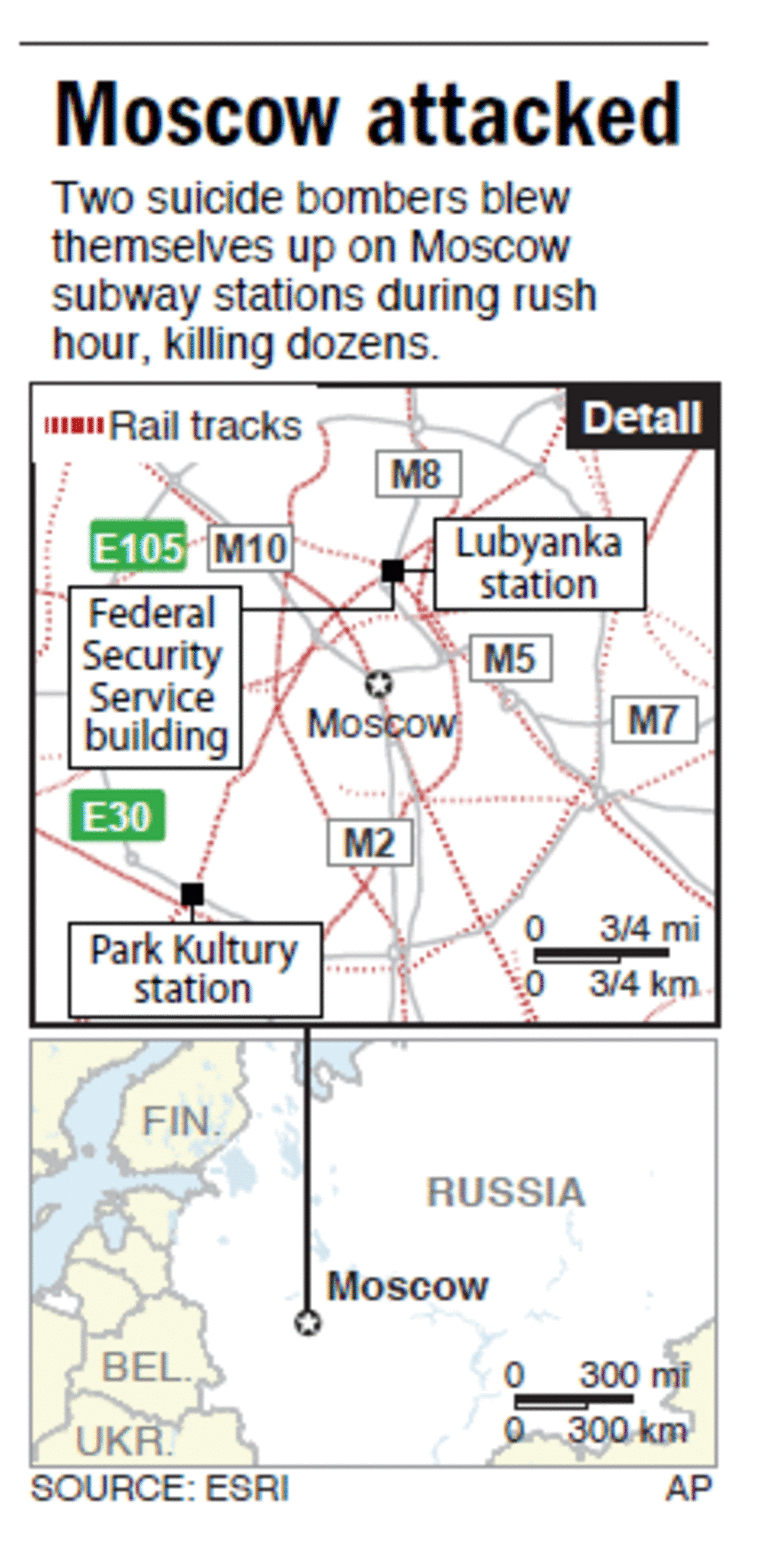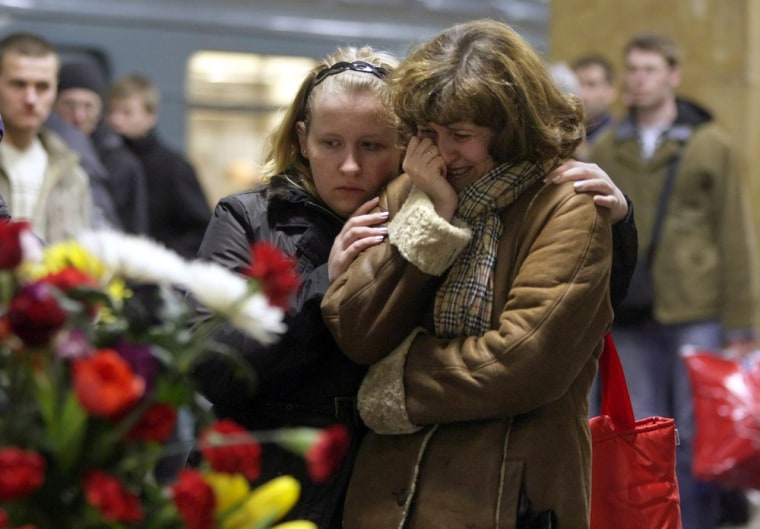Terror returned to the heart of Russia, with two deadly suicide bombings on the Moscow subway at rush hour, including an attack at the station beneath the headquarters of the secret police.
The death toll rose to 39 on Tuesday morning after a woman died in a Moscow clinic from wounds suffered in the strikes, officials said. More than 60 were wounded in Monday's blasts, the first such attacks in the country's capital in six years.
Russian police have killed several Islamic militant leaders in the North Caucasus recently, including one last week in the Kabardino-Balkariya region, which raised fears of retaliatory strikes and escalating bloodshed by the militants.
As smoke billowed through the subway tunnels not far from the Kremlin and dazed survivors streamed out of the vast transportation system, al-Qaida-affiliated Web sites were abuzz with celebration of the attacks by the two female suicide bombers.
The bombings showed that the beleaguered rebels are still strong enough to inflict harm on an increasingly assertive Russia, and they followed a warning last month from Chechen rebel leader Doku Umarov that "the war is coming to their cities."
Prime Minister Vladimir Putin, who built much of his political capital by directing a fierce war against Chechen separatists a decade ago, promised to track down and kill the organizers of what he called a "disgusting" crime.
"The terrorists will be destroyed," he said on national television.
In the wake of the explosions, New York's Metropolitan Transportation Authority announced a "heightened security presence," NBC News reported.
The first blast just before 8 a.m. (12.00 a.m. ET) tore through the second carriage of a train as it stood at the Lubyanka metro station. The explosion killed at least 23 people.
The headquarters of the FSB, Russia's main domestic security service and the successor to the Soviet-era KGB, is located in a building above the station.
'Stampede'
Another blast about 40 minutes later wrecked the second carriage of a train waiting at the Park Kultury metro station, killing at least 14 more people.
"I heard a bang, turned my head and smoke was everywhere. People ran for the exits screaming," said 24-year-old Alexander Vakulov, who said he was waiting on the platform opposite the targeted train at Park Kultury.
"I saw a dead person for the first time in my life," said 19-year-old Valentin Popov, who also was standing on the opposite platform. "Everyone was screaming. There was a stampede at the doors. I saw one woman holding a child and pleading with people to let her through, but it was impossible."
Surveillance camera footage posted on the Internet showed motionless bodies lying in Lubyanka station lobby and emergency workers treating victims.
Emergency Minister Sergei Shoigu initially said the toll was 37 killed and 102 injured, according to Russian news agencies.
Moscow Mayor Yuri Luzhkov said both explosions were believed to have been set off on the trains.
"The first information that the FSB has given us is that there were two female suicide bombers," he told reporters.
Russia's civil aviation regulator ordered local airports to increase security, an official told Reuters.
President Barack Obama condemned the "outrageous" attacks. "The American people stand united with the people of Russia in opposition to violent extremism," he said in a statement.
The Kremlin had declared victory in their battle with Chechen separatists who fought two wars with Moscow; but violence has intensified in the neighboring regions of Dagestan and Ingushetia, where Islamist militancy overlaps with clan rivalries and criminal rings.
'Black Widows'
Jonathan Eyal, director of international security studies with the London-based Royal United Services Institute, said a group known as the "Black Widows" may have been involved in the attack. Some "Black Widows" are believed to have lost brothers or husbands in the Chechen conflict.

"This is a direct affront to Vladimir Putin, whose entire rise to power was built on his pledge to crush the enemies of Russia," Eyal added. "The fact of the matter is that there is very little you can do to protect against this kind of attack without shutting down the entire transport system."
The Moscow subway system is one of the world's busiest, carrying around 7 million passengers on an average workday, and is a key element in running the sprawling and traffic-choked city.
The blasts practically paralyzed movement on the city center's main roads, as emergency vehicles sped to the stations. Helicopters hovered overhead the Park Kultury station area, which is next to the city's renowned Gorky Park.
As they emerged from at the height of the morning rush hour, Muskovites found traffic jams, taxi drivers doubling their prices, and a mobile phone system under severe strain.
Passengers, many of them in tears, streamed out of the station, one man exclaiming over and over "This is how we live!"
"I'm scared. In Moscow we live like on a powder keg," Yevgeniya Popova told Reuters television near the Lubyanka metro station, where the first blast hit.
Many Muscovites simply soldiered on, looking for alternate routes to work. Some pressed cell phones to their ears as they tried to get through to explain they would be late, to do business, or to make sure loved ones were safe.
Next to Popova, a man in his thirties who was visiting Moscow frowned with frustration after half an hour trying in vain to reach his brother.
"I'm not scared, but I feel like we're at war," he said. "My only feeling is to take vengeance. On whom? I don't know yet. But it cannot remain unpunished."
Bias against minorities
Popova had no theories about who was behind the blasts. "Maybe the rebels, maybe Chechnya. Someone is fighting someone. To be honest, I'm lost."
Ekho Moskvy radio said two women wearing Muslim-style headscarves were beaten by four or five passengers on a metro train after the bombings.
Russia is plagued by a strong undercurrent of bias against ethnic minorities from the Caucasus and Central Asia.
Russian media said security agencies were blocking mobile phone connections in the center of Moscow after reports that the bombs were detonated with the help of cellphones. But authorities later said the bombers had blown themselves up.
Both metro stations hit by the blasts are on the red line, which runs close to the Kremlin and is one of the busiest in Moscow. Part of the line was closed and other lines were hit by delays, but the entire system was not shut down.
Announcements informed passengers of delays due to "technical reasons," avoiding anything more specific.
The current death toll makes it the worst attack on Moscow since February 2004, when a suicide bombing killed at least 39 people and wounded more than 100 on a metro train.
Chechen separatists were blamed for that attack.
Favored means of attack
Rapid transit has increasingly become the favored means of attack for Islamist terrorists. Over the past seven years, terrorists have targeted trains and subways throughout the world, killing nearly 800 people and wounding more than 1,500.
Russian police have killed several Islamic militant leaders in the North Caucasus recently, including one last week in the Kabardino-Balkariya region, which has raised fears of retaliatory strikes by the militants.
The militants receive moral and perhaps financial support from al-Qaida. Dozens of contributors to three Web sites affiliated with al-Qaida wrote comments in praise of Monday's attacks.
One site opened a special page to "receive congratulations" for the Chechen rebels who "started the dark tunnel attacks in the apostate countries," and all wished for God to accept the two sisters as martyrs.
"Don't forget Russia's crimes of genocide in the Caucasus and Chechnya," said one writer. "The battle has been shifted to the heart of Moscow," another wrote.
In a televised meeting with President Dmitry Medvedev, Federal Security Service head Alexander Bortnikov said body fragments of the two bombers pointed to a Caucasus connection. The bombers have not been identified and Bortnikov did not elaborate.
"We will continue the fight against terrorism unswervingly and to the end," Medvedev said.
New strategies in the Caucasus?
Neither he nor Putin, who was on an official trip in Siberia, announced specific measures and it was not clear if Russia has new strategies to unleash in the Caucasus, where violent separatism has spread from Chechnya into neighboring republics.
Although the Russian army battered Chechen rebels in massive assaults a decade ago, the separatists continue to move through the region's mountains and forests with comparative ease and launch frequent small attacks.
New York's transit system beefed up security as a precaution following the Moscow bombings. A spokesman for New York's Metropolitan Transportation Authority, Kevin Ortiz, said the agency has a "heightened security presence," but declined further comment.
The agency is in charge of New York City buses and subways, as well as suburban trains, and bridges and tunnels. In London and Madrid, two other cities that have suffered transit system terror attacks, officials said there were no immediate plans to tighten security.
At 4 p.m., the two Moscow subway stations reopened and dozens boarded the waiting trains.
"It's really terrifying," said Vasily Vlastinin, 16. "It's become dangerous to ride the metro, but I'll keep taking the metro. You have to get to school, to college, to work somehow."
Both stations had been scrubbed clean. Holes left by shrapnel in the granite were the only reminder of the day's tragic bombings.
